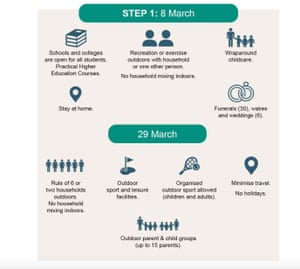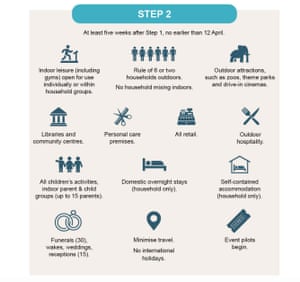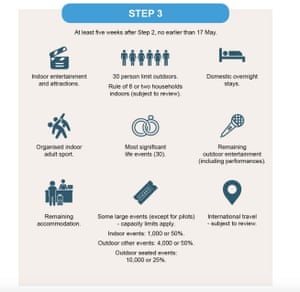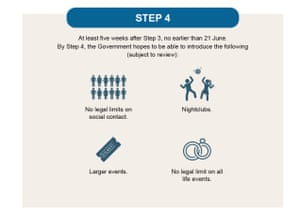
In the Commons Sir Iain Duncan Smith, the former Conservative leader, was the first Tory to suggest the government should go faster. He urged Boris Johnson to consider relaxing the rules for hospitality more quickly, pointing out that some of the lowest paid people in the country were working in the sector.
Johnson acknowledged the point, but said the government could not risk another surge. And he said the dates provided today gave the sector some certainty.
The government has sent its 60-page roadmap to lifting lockdown to journalists. I can’t find it on the government’s website yet, but here are four graphics from it summarising the potential timetable for relaxing measures.
The document is headed: Covid-19 Response – Spring 2021. That might be a tacit acknowledgment that this not the first lockdown lifting plan it has published. We had another one last May.

Step 1 Photograph: Gov.UK

Step 2 Photograph: Gov.UK

Step 3 Photograph: Gov.UK

Step 4 Photograph: Gov.UK
Ian Blackford, the SNP leader at Westminster, says the UK government’s plans will be worthless if the virus is allowed to re-enter the country. He says Boris Johnson should follow the Scottish government, which is imposing hotel quarantine on all arrivals.
Johnson claims the UK has some of the toughest travel restrictions in the world. And he says vaccines are being developed to counter the new variants.
Theresa May, the Conservative former prime minister, urges the PM to do more to help the aviation industry. She says the travel review will not report until 12 April. Airlines needs three months to prepare, she says.
Johnson says the government will continue to support the aviation industry.
Sir Keir Starmer used his response to Johnson to restate his call for teachers to be vaccinated, and to say that Johnson should not wait until the budget next week before confirming that furlough will be extended.
In his response, Johnson said that Labour wanted to stay in the European Medicines Agency, which he claims would have made the vaccine rollout impossible.
But he thanks Starmer for offering his cautious support for the plan.
Guide to PM’s four-stage plan to lifting lockdown in England
Here is a summary from my colleague Peter Walker of the plan announced by Boris Johnson.
Updated
at 11.16am EST
Johnson says four reviews will also be carried out.
They will cover: the case for Covid status certificates; how events can be staged; how travel can be facilitated; and social distancing.
And he says next month the government will publish a plan for dealing with local outbreak and variants of concern.
He ends by saying it is important to be cautious, and humble in the face of the virus. But the end is in sight, he claims.
Johnson says step four will start no earlier than 21 June.
At that point all limits on social contacts should be lifted.
And he says large events like weddings should be able to go ahead.
Johnson says step three will start no earlier than 17 May.
Most restrictions on meeting outdoors will then be lifted, he says.
Pubs and restaurants will open for indoor service, he says.
Cinemas, play areas, hotels, and theatres will also open, he says. And larger events will be allowed, subject to enhanced testing.
Johnson says step two will start no earlier than 12 April.
Non-essential retail will open. People will be able to get a haircut.
Pubs and restaurants will begin to open, for outdoors service. There will be no curfew, and no requirement for people to order a substantial meal.
Zoos, theme parks, and drive-in cinemas will open, as will public libraries and community centres.
Updated
at 10.52am EST
Johnson confirms that schools will open from 8 March.
They will be supported by twice weekly testing, he says.
Students on university courses requiring practical teaching, specialist facilities and on-site assessments will also return. But all others will need to continue learning online, and we will review the options for when they can return by the end of the Easter holidays.
And from 29 March people will be able to meet outside, subject to the rule of six, or provided no more than two households are meeting.
People will no longer be legally required to stay at home. For many lockdown restrictions will remain. People should continue to work from home where they can, and minimise all travel, wherever possible.
Updated
at 10.53am EST
Johnson says his approach will be led by data, not deaths.
And four tests will apply, he says. He reads them out. (See 12.49pm.)
He says the government will move forward in four steps.
There will be at least five weeks between each step – four weeks to acquire data on its impact, and a week to give people notice of what is happening next.
He says Prof Chris Whitty, the chief medical officer, has said that moving faster would increase the chances of the government having to reverse course and reimpose restrictions. “I won’t take that risk,” says Johnson.
Johnson says these measures are for England. But he says the devolved administrations have similar plans.
He says the vaccines seem to be effective against the dominant strains of the virus.
But he says it is inevitable that lifting restrictions will lead to more hospital cases and more deaths.
There is no credible route to a zero Covid future, he says.
Boris Johnson starts by saying his roadmap will guide the government “cautiously but irreversibly” to lifting the lockdown.
Boris Johnson’s Commons statement on roadmap to easing lockdown
Boris Johnson is about to make his Commons statement on the roadmap for easing the lockdown in England.
After he has spoken, Johnson will respond to questions from MPs. There are 100 MPs down to speak; the list is here. Sir Keir Starmer will be the first to respond.
Forty MPs have signed a Commons early day motion tabled by the Labour leftwinger Richard Burgon calling for the government to “adopt a zero Covid plan that seeks the maximum suppression of the virus as the best way to save lives and allow our communities and the economy to safely reopen”. It cites New Zealand and Vietnam as examples of countries where this approach has kept the death rate down, while allowing the economy to reopen. Among the signatories are MPs from Labour, the SNP, the Lib Dems, Plaid Cymru, the SDLP and the Greens.
Richard Burgon MP
(@RichardBurgon)40 MPs from 6 parties have backed my call for the PM to adopt a Zero Covid strategy as New Zealand and others have done to deal successfully with this crisis.
That’s the best way to save lives and allow our communities and the economy to reopen safely.https://t.co/cQBPD3riMe
Updated
at 10.36am EST
Northern Ireland has recorded 187 more coronavirus cases and four further deaths. A week ago today there were also four deaths recorded, but 234 new cases.
Department of Health
(@healthdpt)The Department of Health #COVID19 dashboard has been updated.
187 individuals have tested positive for COVID-19 in the past 24 hours. Sadly, a further 4 deaths have been reported.https://t.co/ZhGagw1BNL pic.twitter.com/g0oDpTGFzS


